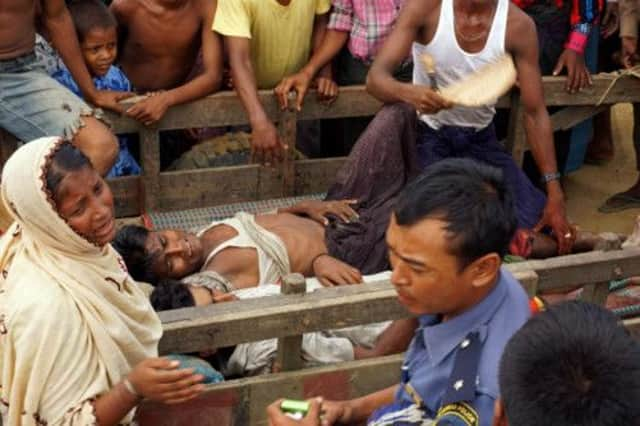Burma camp deaths dash rights abuse hopes


Burma’s president Thein Sein announced the immediate disbandment of the Nasaka force just days before a visit to Britain last month. The move was widely seen as an attempt to address international concerns over alleged human rights abuses by the agency against the Muslim Rohingya minority.
But the latest killings led to claims that many former Nasaka members have simply moved to the police force and there has been no real change of attitude or behaviour towards the Rohingya.
Advertisement
Hide AdAdvertisement
Hide AdRegarded as illegal immigrants from Bengal and denied official citizenship by the Burmese government – though many have lived in the country for generations – over 120,000 Rohingya have been fenced into camps where security is largely overseen by officers from the majority Buddhist population.
Witnesses says it was only the intervention of the army, who dispersed police within the camp, that prevented further violence in the latest round of attacks, and concerns remain that authorities have not investigated the cause of death of the Rohingya fisherman, whose battered body sparked the most recent conflict amid claims he had been tortured and killed by police.
David Scott Mathieson of Human Rights Watch said: “Disbanding the Nasaka is a hollow gesture if the government then permits their transfer to paramilitary police forces that behave in the same brutal manner. The Rakhine State authorities and national government have to end the culture of abuse and impunity that the police force enjoy in these areas.”
The concerns came to light after the body of a 48-year-old Rohingya fisherman was found near the Aun Daw Ji camp beside Rakhine state capital Sittwe on 9 August, prompting protests in the camps which led to police shootings that left at least two more men dead and about a dozen seriously injured with bullet wounds. A further two men were reported to have also died in the shootings.
Police said the fisherman had died in an accident, but his body showed signs of assault, including head injuries, missing front teeth, and skin blistering which the man’s widow said looked as if boiling water had been poured on him.
Rohingya sources within the camp claimed the 48-year-old man had been attacked and killed by police after he witnessed officers with a prostitute and told other villagers what he had seen.
The man’s 35-year-old widow called on a proper investigation into her husband’s death and on the authorities to restore peace within the camps.
“The government needs to control the police,” she said.
“I want to say to the authorities to keep the law and order so there can be peace in the camps and life can be better,” added the mother of five.
Advertisement
Hide AdAdvertisement
Hide AdAung Win, a spokesman for the Rohingya community, said: “The first thing I would call for is a proper investigation into what happened to the fisherman. The other thing is that there needs to be a properly trained and disciplined force to look after security in this area. The police at the moment are not properly trained and that is a serious problem.”
Rakhine State government spokesman Win Myaing told international reporters the most recent violence in the camps had been arranged by Rohingya people.
“They want to show to the international community the Rakhine State government is neglecting them,” he said.